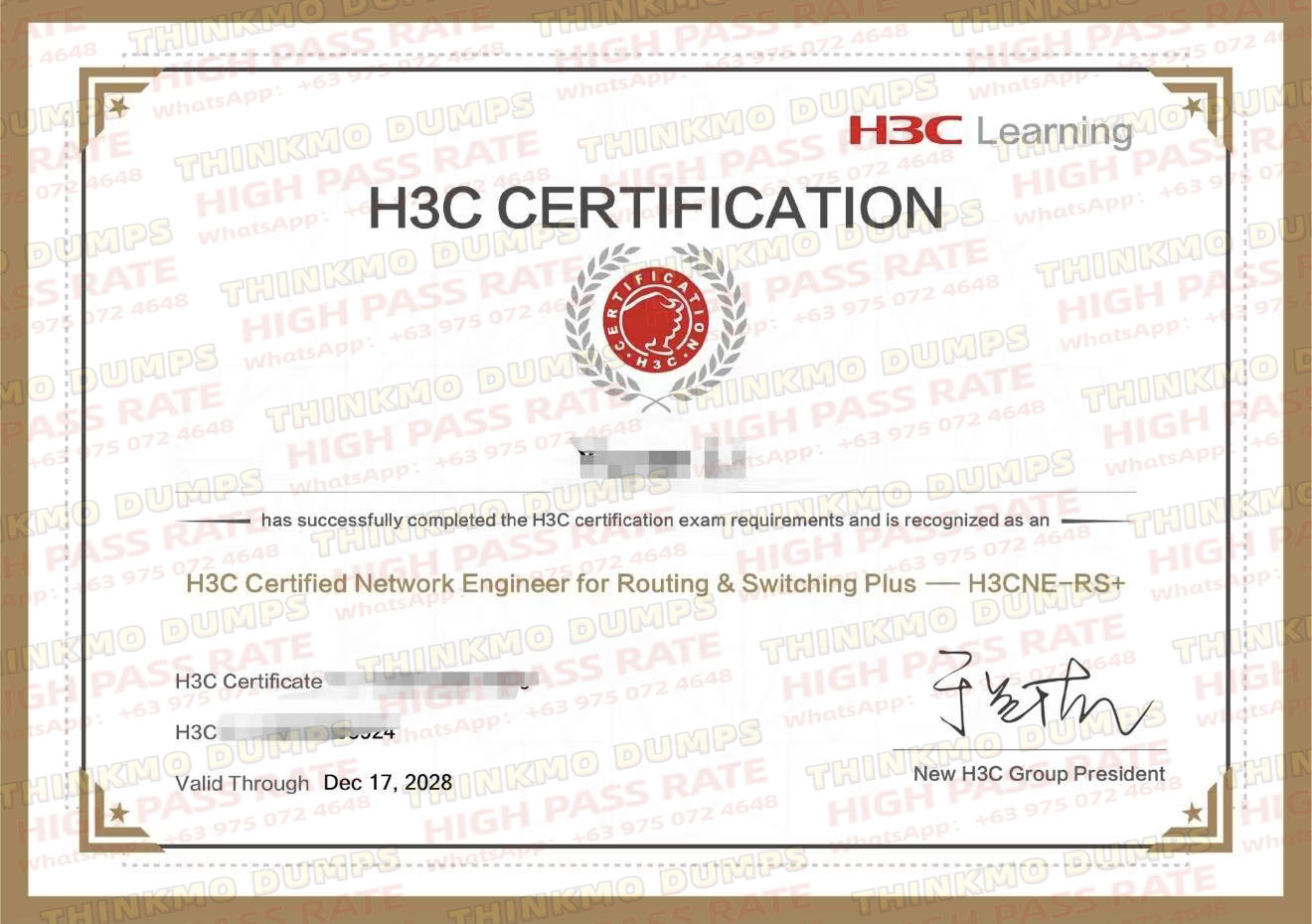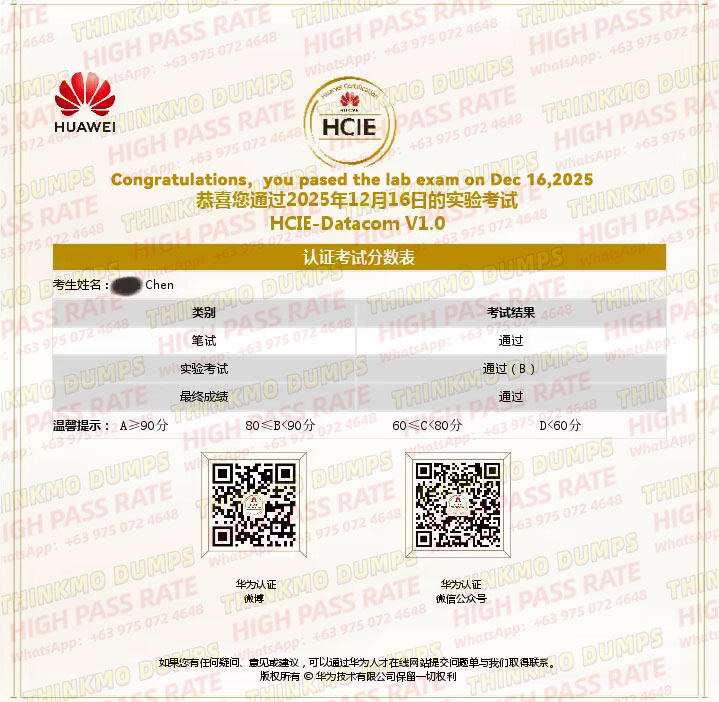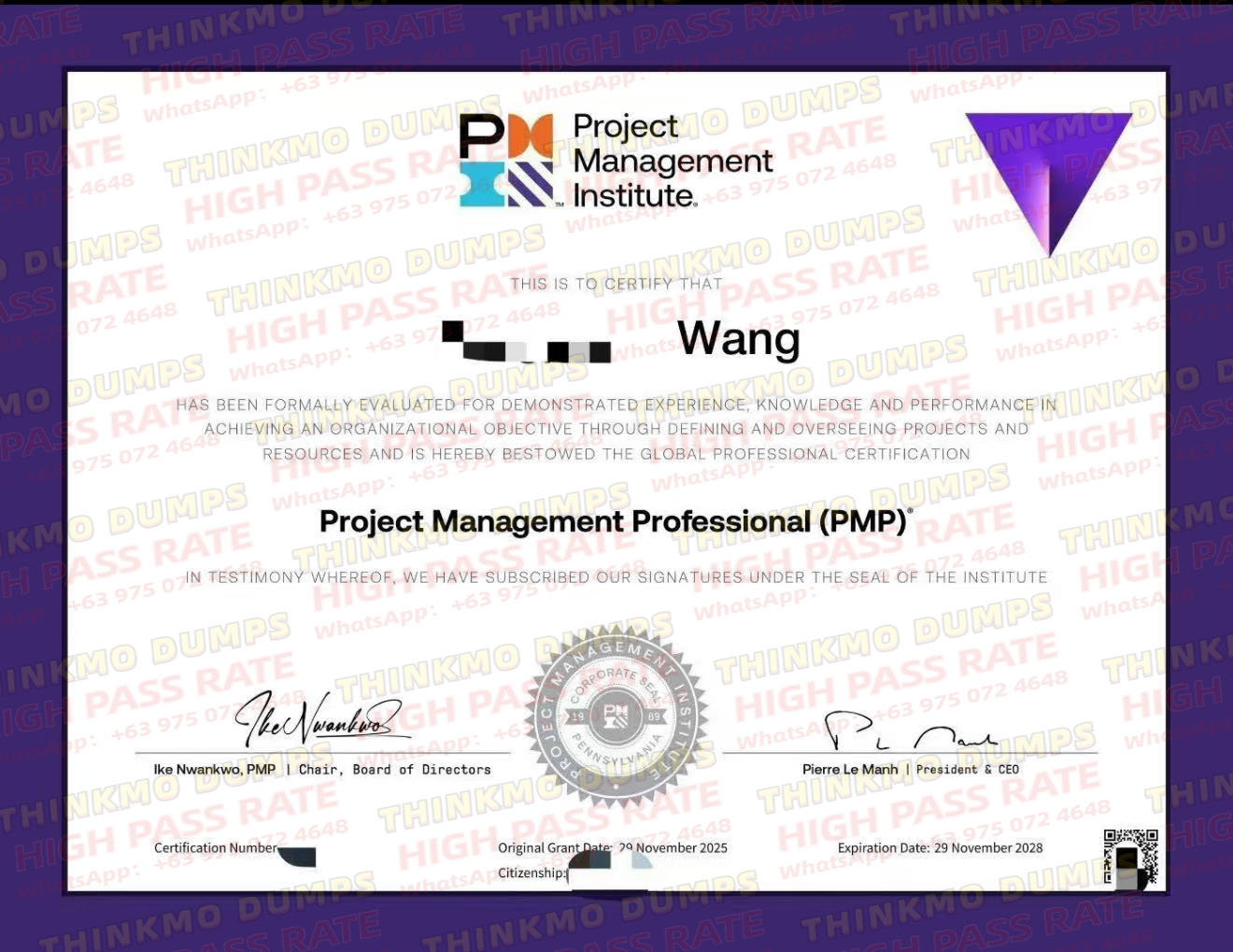How Valuable is the Cisco CCNP Certification?
Update time:2025-09-30
Many people often ask: “Is it really worth spending 2–3 months preparing for the CCNP?Will this certification actually help in the industry?”

As a senior network engineer, here’s the truth.The CCNP is the “intermediate benchmark” in Cisco’s certification path.It builds on CCNA fundamentals and bridges the gap toward CCIE’s advanced skills.Its value doesn’t come from hype — it comes from how well it aligns with enterprise demand for skilled, mid-level engineers.It’s more advanced than CCNA but not as high-barrier as CCIE, making it a perfect fit for most enterprise hiring needs.

1.Core Value: Matching Mid-Level Engineering Skills
Compared to CCNA:
CCNA focuses on basic concepts and simple tasks (e.g., VLAN setup, static routing).CCNP, however, covers enterprise-grade deployments:
Advanced Routing: BGP policy optimization, OSPF multi-area design
Switching: MSTP loops & load balancing, EtherChannel aggregation
Security & QoS: IPSec VPN deployment, voice traffic QoS
These skills map directly to enterprise requirements — e.g., BGP tuning for branch connectivity, MSTP for campus networks, and VPN deployment for remote offices.
Compared to CCIE:
CCIE deals with large-scale, highly complex networks (e.g., global backbones, data center spine-leaf). Preparation takes 6+ months. CCNP, by contrast, is designed for mid-sized enterprise needs like:
Campus network operations
Branch office connectivity
Basic troubleshooting
With 2–3 months of focused preparation using dumps and practice exams, you can cover ~80% of mid-level job requirements, making CCNP much more cost-effective than CCIE.
2. Market Recognition & Salary Impact
Where CCNP is Recognized:
Cisco Partner Companies: System integrators and resellers often require CCNP for mid-level engineers, directly tied to project delivery.
Enterprise IT Departments: Banks, manufacturers, government organizations using Cisco gear give CCNP holders ~30% higher résumé pass rates.
Multinationals & Overseas Projects: High international recognition; HR teams know Cisco certifications well.
Salary Benchmark (Tier-1 Cities):
With CCNP: ¥12K–20K/month
Without Certification (same experience): ¥10K–17K/month
That’s a 10–20% premium, thanks to the ability to independently solve enterprise-level issues (e.g., VPN deployments, BGP troubleshooting).
3. Career Development Path
Typical Roles:
Mid-level Network Operations (campus & branch management)
Technical Support Engineer (vendor or integrator support)
Assistant Network Architect (designing small-scale topologies)
Next Steps:
Toward CCIE: CCNP is a solid prerequisite;many modules overlap.
Specialization: With additional focus, you can branch into Security (CISSP) or Cloud Networking (AWS/Azure certifications).
4. Limitations of CCNP
Non-Cisco Environments: Firms dominated by Huawei or H3C prefer HCIP certification. While commands differ, network fundamentals remain transferable.
Pure Cloud-Native Environments: In companies running Kubernetes networking or cloud VPCs, traditional Cisco tech is less relevant. Here, CCNP should be paired with cloud vendor certifications.
5. Who Should Take CCNP?
Recommended Candidates:
Network engineers with 1–2 years’ experience aiming to move from junior to mid-level roles
Those targeting Cisco ecosystem partners, enterprises, or multinational firms
Professionals wanting a short-term (2–3 month) boost in career competitiveness
Think Twice If:
Your company uses only Huawei/H3C gear with no Cisco in sight
You work purely in cloud-native networking (e.g., SRE in big internet firms)
6. Effective Exam Preparation with Dumps
When preparing for CCNP, structured study is key.Instead of relying solely on videos or random tutorials, leverage authentic CCNP dumps and past exam dumps to:
Familiarize yourself with the real exam format
Identify weak areas quickly
Focus practice on high-frequency topics (e.g., BGP path selection, VPN configuration)
This approach helps you systematically cover exam points and maximize your study efficiency.
Summary
The value of CCNP lies in its practical technical depth and balanced investment-to-return ratio.It directly meets enterprise demand for mid-level engineers and delivers clear career benefits.
If you have 1–2 years of network operations experience and want to move up, especially into Cisco ecosystem firms or multinationals, CCNP is worth it.If your focus is purely cloud-native or non-Cisco, you may need to pair it with other certifications.
And one final reminder: a certificate is proof of ability, not a substitute for it.Don’t just memorize answers from the dumps — combine study with lab practice.Only when you can troubleshoot and deploy real enterprise networks will your CCNP truly demonstrate its value.

As a senior network engineer, here’s the truth.The CCNP is the “intermediate benchmark” in Cisco’s certification path.It builds on CCNA fundamentals and bridges the gap toward CCIE’s advanced skills.Its value doesn’t come from hype — it comes from how well it aligns with enterprise demand for skilled, mid-level engineers.It’s more advanced than CCNA but not as high-barrier as CCIE, making it a perfect fit for most enterprise hiring needs.
1.Core Value: Matching Mid-Level Engineering Skills
Compared to CCNA:
CCNA focuses on basic concepts and simple tasks (e.g., VLAN setup, static routing).CCNP, however, covers enterprise-grade deployments:
Advanced Routing: BGP policy optimization, OSPF multi-area design
Switching: MSTP loops & load balancing, EtherChannel aggregation
Security & QoS: IPSec VPN deployment, voice traffic QoS
These skills map directly to enterprise requirements — e.g., BGP tuning for branch connectivity, MSTP for campus networks, and VPN deployment for remote offices.
Compared to CCIE:
CCIE deals with large-scale, highly complex networks (e.g., global backbones, data center spine-leaf). Preparation takes 6+ months. CCNP, by contrast, is designed for mid-sized enterprise needs like:
Campus network operations
Branch office connectivity
Basic troubleshooting
With 2–3 months of focused preparation using dumps and practice exams, you can cover ~80% of mid-level job requirements, making CCNP much more cost-effective than CCIE.
2. Market Recognition & Salary Impact
Where CCNP is Recognized:
Cisco Partner Companies: System integrators and resellers often require CCNP for mid-level engineers, directly tied to project delivery.
Enterprise IT Departments: Banks, manufacturers, government organizations using Cisco gear give CCNP holders ~30% higher résumé pass rates.
Multinationals & Overseas Projects: High international recognition; HR teams know Cisco certifications well.
Salary Benchmark (Tier-1 Cities):
With CCNP: ¥12K–20K/month
Without Certification (same experience): ¥10K–17K/month
That’s a 10–20% premium, thanks to the ability to independently solve enterprise-level issues (e.g., VPN deployments, BGP troubleshooting).
3. Career Development Path
Typical Roles:
Mid-level Network Operations (campus & branch management)
Technical Support Engineer (vendor or integrator support)
Assistant Network Architect (designing small-scale topologies)
Next Steps:
Toward CCIE: CCNP is a solid prerequisite;many modules overlap.
Specialization: With additional focus, you can branch into Security (CISSP) or Cloud Networking (AWS/Azure certifications).
4. Limitations of CCNP
Non-Cisco Environments: Firms dominated by Huawei or H3C prefer HCIP certification. While commands differ, network fundamentals remain transferable.
Pure Cloud-Native Environments: In companies running Kubernetes networking or cloud VPCs, traditional Cisco tech is less relevant. Here, CCNP should be paired with cloud vendor certifications.
5. Who Should Take CCNP?
Recommended Candidates:
Network engineers with 1–2 years’ experience aiming to move from junior to mid-level roles
Those targeting Cisco ecosystem partners, enterprises, or multinational firms
Professionals wanting a short-term (2–3 month) boost in career competitiveness
Think Twice If:
Your company uses only Huawei/H3C gear with no Cisco in sight
You work purely in cloud-native networking (e.g., SRE in big internet firms)
6. Effective Exam Preparation with Dumps
When preparing for CCNP, structured study is key.Instead of relying solely on videos or random tutorials, leverage authentic CCNP dumps and past exam dumps to:
Familiarize yourself with the real exam format
Identify weak areas quickly
Focus practice on high-frequency topics (e.g., BGP path selection, VPN configuration)
This approach helps you systematically cover exam points and maximize your study efficiency.
Summary
The value of CCNP lies in its practical technical depth and balanced investment-to-return ratio.It directly meets enterprise demand for mid-level engineers and delivers clear career benefits.
If you have 1–2 years of network operations experience and want to move up, especially into Cisco ecosystem firms or multinationals, CCNP is worth it.If your focus is purely cloud-native or non-Cisco, you may need to pair it with other certifications.
And one final reminder: a certificate is proof of ability, not a substitute for it.Don’t just memorize answers from the dumps — combine study with lab practice.Only when you can troubleshoot and deploy real enterprise networks will your CCNP truly demonstrate its value.
I'm your man who have the 100% valid dumps , buy it now for 50% off to clear your exam!
Click it ↓↓

Hot article
-
 1
1 1. ThinkMo Precise Question Bank: Ace HCIE Written
上传:2026-01-23
-
 2
2 Triple H3CNE/H3CSE Passes | ThinkMo Christmas Succe
上传:2025-12-25
-
 3
3 Success Streak: ThinkMo’s Dec HCIE-Datacom Win
上传:2025-12-24
-
 4
4 ThinkMo Guide: Cisco & Huawei Certification Com
上传:2025-12-22
-
 5
5 Pass CCIE/CKA Exams with ThinkMo’s Top Question B
上传:2025-12-19








